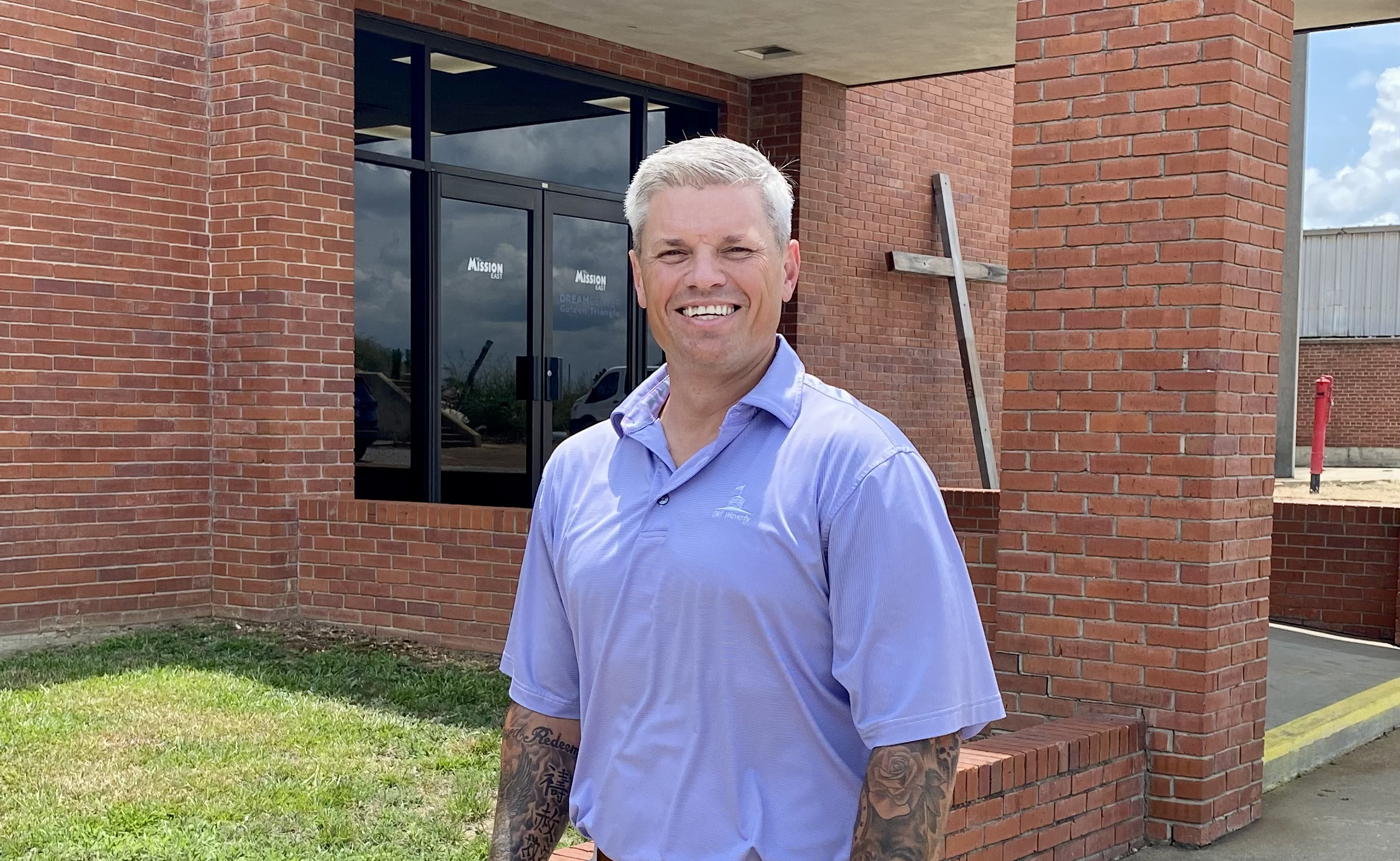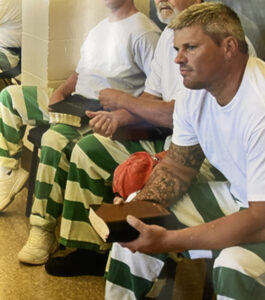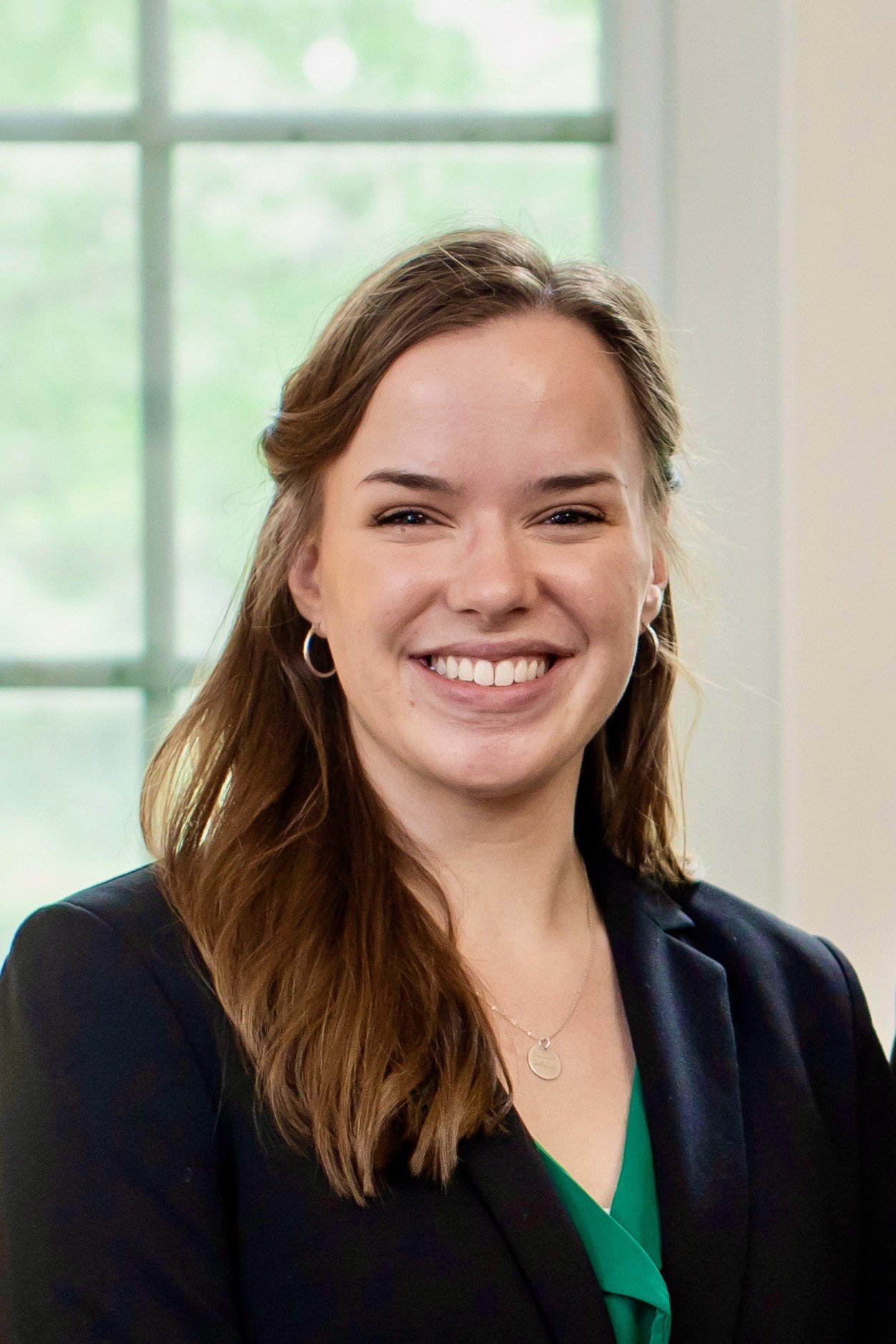A new conviction

“If it allows me to change one person, it would make it all worth it.”
That’s how Ben Little describes his life’s story which includes struggles with addiction, a suicide attempt, and prison time followed by a new life found in the salvation of Jesus Christ. Today, Ben uses his own life experiences to help others at The Mission in West Point where he serves as the director. The center stands as a beacon of hope for those in recovery by providing education-based intervention, treatment, and counseling services.
Early Years
Ben grew up in Brandon living a relatively normal life. He was raised in a Christian home by his grandparents. In his teens and through college, though, he found himself seeking purpose without a strong direction.
“I always knew there was something more but never really could find it.”
Ben spent most of his young adult life searching. He was searching for a place to belong, searching for a purpose for his life, and searching for something to make him feel whole. That search led him to pain medication in his early 30s where he quickly became addicted. Ben had taken a job in Connecticut and was working as a finance director. During that time he got married and had a son.
Addiction
His addiction to drugs started with his wife’s prescription pain pills.
“I was a high-functioning addict,” he said. “I was able to hide it and go to work at the same time. I went to detox which is where I was first introduced to heroin.”
Ben had lost his wife and his son. He was at the lowest point of his life and turned to something stronger – heroin.
“The day after detox was when I first used heroin,” he said. “It didn’t take long. Over the next two years I became homeless and was living out of my car in Connecticut.”
In despair having lost his family, his job, his home, and everything that meant anything to him, Ben made a decision.
“It was on March 8, 2013, that I made the decision to take my life,” he said.
The next day Ben was found lying on the floor by a friend who called his family back home in Mississippi. His parents made the trip to Connecticut to bring him back home hoping life would get better. It didn’t.
“Thirteen hundred miles didn’t change anything except my drug of choice,” said Little. “I began using methamphetamine when I got home and 16 months later I had six felonies in three counties.”
Incarceration
 In February 2014 it caught up with him when he was held on a charge in Hinds County.
In February 2014 it caught up with him when he was held on a charge in Hinds County.
“That was the first time I had to face the consequences of my own actions and that’s where my journey began,” he said.
While in jail, Ben had what he describes as his “Damascus road moment,” referring to Saul’s conversion in the Bible.
“I told God that if He was real, I would give him all that I had, which was nothing,” said Little. “I knew I was going to wear stripes, I knew I was losing everything except for my Bible and that I was going to prison with nothing.”
He struggled for the first two years with relapse during incarceration as prison is not an escape from drugs but rather an intersection of access to drugs.
“I had no value and God began to change my heart,” he explained.
Finding Hope
He began to reflect on his life as his 40th birthday approached. Ben was ready to leave the life of addiction and the pain behind. He made it his mission to begin anew and on his 40th birthday February 23, 2017, he got sober.
“From that day forward I have been completely clean and sober. I haven’t had a taste or desire and I’ve taken people to detox who were doing the same drugs that I did, it’s like a totally different person,” he said.
During his time in Mississippi Department of Corrections custody, Ben spent time at Parchman, and Greene County before being moved to Central Mississippi Correctional Facility (CMCF) where he spent the last three and a half years of his incarceration. At CMCF he worked for the chaplain and then was moved to teach the GED program. In his last 18 months, he was recommended by the superintendent to join the veterans program at the prison. The program, run by BR Hawkins, is exclusively for incarcerated veterans. They are housed separately and are able to participate in their own classes and programs including training therapy dogs. While Ben is not a veteran Hawkins allowed him to participate in the program because of his good standing at the prison. Ben joined and worked as a spiritual mentor from 2018 until his release in 2019.
The veterans unit was the only self-contained unit on the CMCF campus that had air conditioning.
“We only got the A/C because they came in and told us that it was inhumane to have the dogs that we were training in a building with no A/C. That was the most humiliating thing to hear because we were human beings,” he said.
During his time there, the president of Mississippi University for Women Nora Miller came to speak to the veterans. He was able to share his newfound passion for counseling and teaching with Miller who would later be influential in helping him to return to school after his release.
Ben was married in 2018 to his wife Sheila during his incarceration.
“We had known each other before,” he said, “and she found me by searching online. When she did, my mugshot came up and she called around to the prisons before she found out where I was.”
The two wrote letters back and forth for three years, she came and visited every week for two years, and they were married at the chapel at CMCF in 2018.
Second Chance
Ben was released in November 2019 and just a few months later by January of 2020, he was attending school. He began volunteering at the Mission as a one-on-one counselor and by February he was part of the full-time staff. He began to use his life experiences to show others what it could look like on the other side of addiction.
“I think it helps the guys to know that they are dealing with someone that understands, and knows, and has felt rock bottom and has still made it through it,” said Little. “If you’ve got breath, there is opportunity.”
Second chances are important in order to push people forward out of these damaging cycles.
“If you don’t get a second chance, you are never going to fall forward,” he said. “So often, we fall and make mistakes, we go one direction, either we fall back into making the same mistakes and into the same unhealthy patterns or we fall forward.”
It is vital for recovery to see the problem and the person separately, to see the negative from the positive.
“Being incarcerated you feel like you don’t matter, many people that are incarcerated don’t have anyone to call or put money on the books, they feel like they are forgotten.”
So many individuals that come out of the justice system are not used to interacting with genuine compassion. The cycle of manipulation is ingrained in their minds so programs like the one at The Mission help to unravel that mindset.
“Everybody thinks going home is a better alternative, when in reality that could be their trigger,” Ben said.
The Mission provides mentorship to men and helps them to get away from any selfish behavior. It helps to create a healthy family perspective and teaches them how to live outside of themselves and truly care for someone else.
“They are all trying to be better than the day before, that is something that they all have in common,” said Little.
During his time at MUW, Little not only received a degree but also child advocacy studies training in order to counsel with the knowledge that addiction affects not only the individual but especially children.
Little is now doing all he can to further his education and act as a voice for so many of those within the justice system. He is able to go with The Mission program participants and represent them in court and speak on their behalf. This fall he will work towards his master’s degree in clinical mental health counseling at Mississippi State University.
“I want to be a voice for the voiceless and to assist in finding alternative measures to train and educate inmates prior to their release on the realities that they are truly going to face and the hardships that are coming,” said Little. “We can’t give up on people. I never thought I’d be doing what I’m doing. I’m someone who didn’t get life right the first time, but I don’t think any of us got it right the first time.”
You can help provide second chances in Mississippi. Please sign the petition below.
